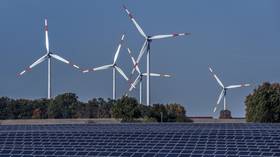IMF warns of consequences of Russian gas shutoff
A total shutdown of Russian gas supplies to the EU could reduce the GDP of the most vulnerable member states by up to 6% and send them into a recession, the International Monetary Fund said in a blogpost on Tuesday.
The warning comes amid fears that Russian gas deliveries to Europe via the Nord Stream 1 pipeline may not resume after the routine annual maintenance ends on Thursday.
Earlier this week, the Wall Street Journal, citing European Budget Commissioner Johannes Hahn, reported that the European Commission did not expect the pipeline to restart. On Tuesday, the commission’s spokesperson said it was planning for all scenarios regarding Russian gas flows to Europe through the Nord Stream 1 pipeline. According to Reuters’ sources, the gas flows will restart as scheduled “but at lower than its full capacity.”
The IMF noted that Europe lacks a comprehensive plan to cope with gas shortages, which could lead to energy price increases and slower growth. The Washington-based fund said that Hungary, Slovakia, and the Czech Republic are the three EU member states likely to suffer the most in case of a complete shutoff.
“The prospect of an unprecedented total shutoff is fueling concern about gas shortages, still higher prices, and economic impacts. While policymakers are moving swiftly, they lack a blueprint to manage and minimize impact,” the IMF wrote.
Warning that central and eastern Europe could see shortages of as much as 40% of gas consumption and that GDP could shrink by up to 6%, the fund suggests that these countries should secure “alternative supplies and energy sources” and encourage energy savings and expand solidarity agreements to share gas across countries.
The IMF notes that Europe’s energy infrastructure and global supply have so far coped with a 60% drop in Russian gas deliveries since June last year, and could potentially handle a reduction of up to 70% by accessing alternative supplies and energy sources.
However, the fund warns that a complete shutoff would make diversification much harder as bottlenecks could reduce the ability to reroute gas within Europe because of insufficient import capacity or transmission constraints.
The IMF added that in case of a total shutdown, the entire EU could suffer a drop in economic output of almost 3% over the next year. It notes that while some countries like Sweden, Denmark, and Greece would likely see little to no impact on growth, Italy, due to its high reliance on gas in electricity production, could experience a drop of over 5%.
“The effects on Austria and Germany would be less severe but still significant, depending on the availability of alternative sources and the ability to lower household gas consumption,” the fund said.
After Russia launched its military operation in Ukraine in late February, the EU passed six packages of sanctions to punish Moscow. The bloc, which receives roughly 40% of its gas from Russia, has been trying to rapidly reduce its reliance on the country’s energy as part of restrictive measures.
Russian President Vladimir Putin noted on Tuesday that Brussels imposed sanctions on Moscow and closed off supply routes, but is now blaming its gas shortages on Russia and energy giant Gazprom.
Russia is ready to deliver as much gas as the bloc needs, if the EU is ready to stop “stepping on rakes,” he told a media conference while visiting Tehran.
“Gazprom has always honored, and will continue to honor its commitments,” he said.
You can share this story on social media:








Comments are closed.